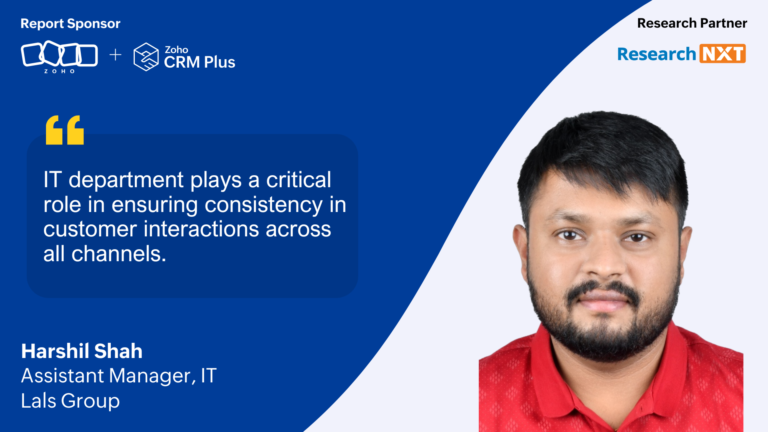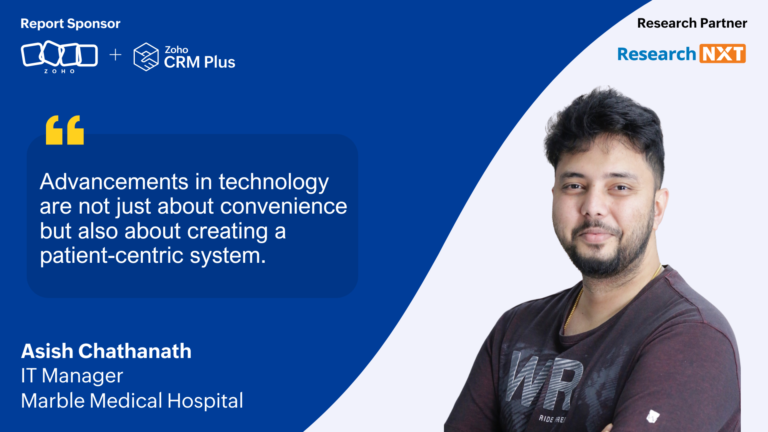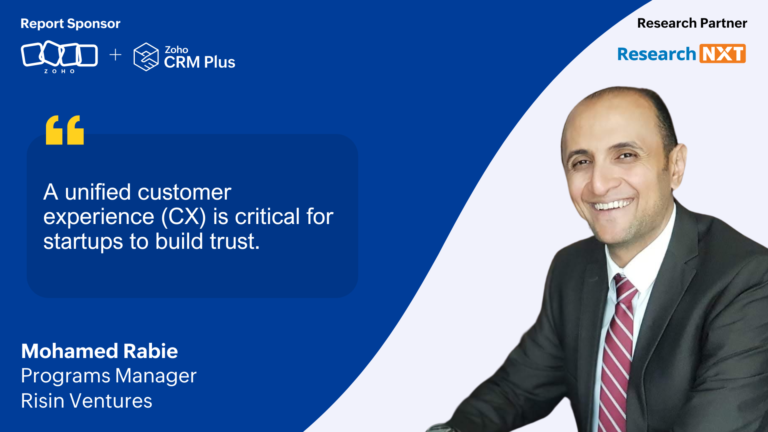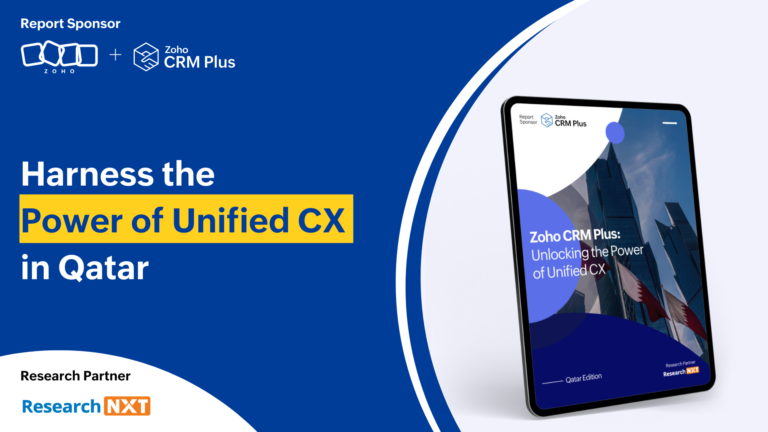Bridging Cultures and Redefining Customer Experience Across MEA with Zoho
In this interview with Research NXT, Vaishnavi Soundarrajan, Regional Manager of Marketing for Zoho Middle East and Africa, shares an inspiring journey from a background in Home Science to leading Zoho’s marketing efforts across a diverse and dynamic region. With nearly a decade at Zoho, the interview explores strategies for delivering consistent and unified customer experiences (CX), leveraging automation and AI, and navigating the unique challenges of the Middle East and Africa markets. The conversation highlights Zoho’s innovative approach to CX, rooted in adaptability, cultural sensitivity, and technological advancement.
Key Takeaways:
- Zoho tailors its strategies to meet the diverse technological and cultural needs of the Middle East and Africa.
- Zoho One provides businesses with modular solutions, allowing them to implement applications incrementally based on their priorities and readiness.
- Metrics such as support response time, customer retention, and application adoption rates guide Zoho’s CX evaluation.
- Tools like Zoho CRM Plus and Zia empower businesses to elevate their CX through advanced analytics, omnichannel integration, and AI capabilities, ensuring a comprehensive and future-ready approach to customer engagement.
“With the increasing focus on hyper-personalisation, predictive analysis, and AI-driven efficiencies, automation is set to play a pivotal role, particularly in regions like the Middle East and Africa (MEA).”
Please share a brief overview of your professional journey leading up to your current position as Regional Manager of Marketing for Middle East & Africa at Zoho.
Vaishnavi: It’s been quite a journey—from someone not even allowed to cross roads independently to crossing continents today. I completed my undergraduate degree in Home Science, initially envisioning a future as a homemaker. However, by my second year, I decided to pursue an MBA, specialising in International Business with a focus on Marketing. Little did I know that one day I’d be leading marketing for such a distinguished organisation. It wasn’t planned, but everything fell into place.
I began my career with Citi in the loans division, followed by an interesting stint in fraud control. After a career break to raise my twins, I decided to explore marketing and started as a freelance content writer. This marked the start of a new phase in my professional life.
Soon after, I joined Zoho as a content writer for Zoho CRM. After a couple of years in this role, I transitioned into event management, which gave me invaluable exposure to different cultures and international markets. At Zoho, everything is managed in-house, so as an event manager, I handled everything from creating copy and designing landing pages to executing events and managing attendee experiences. This end-to-end ownership provided immense learning opportunities.
Eventually, I began working on the Middle East and Africa markets, leveraging my content background and marketing skills. Over time, my portfolio expanded as my potential was recognised, and here I am, nearly a decade with Zoho—grateful for a journey that’s been challenging, enriching, and transformative.
As the Head of Marketing for MEA, what does your role at Zoho involve on a day-to-day basis? What are your primary responsibilities in overseeing marketing efforts across such a diverse region?
Vaishnavi: My role is a blend of strategy, execution, and extensive collaboration. With a distributed team across multiple countries, daily work involves strategising and coordinating with local teams to ensure seamless execution.
A key responsibility is ensuring that Zoho’s messaging resonates effectively in each market while maintaining consistency. This requires understanding cultural nuances, digital maturity, and adoption rates in different regions. By aligning strategies with these factors and collaborating closely with local teams, we aim to deliver messaging that is not only clear but also well-received in every market.
Read More
From your perspective, what does a unified customer experience (CX) mean for businesses in the Middle East?
Vaishnavi: For me, it’s about ensuring we deliver value and support in a way that provides a seamless and consistent experience across all touchpoints. Whether someone interacts with a partner, visits our website, reaches out to support, or meets an employee at an event, the experience should be unified and cohesive.
This philosophy extends to what we aim to enable for our customers. Just as we strive for consistency, we want our customers to provide the same seamless experience to their own clients. For example, if you raise a complaint on social media about a service issue and then call customer support, you don’t want to start from scratch and explain the issue again. As a customer, that disconnect can be frustrating.
We ensure that our customers have the tools and support needed to eliminate these gaps, empowering them to deliver smooth, connected interactions to their clients, just as we prioritise for our own.
Given that CX expectations can vary significantly between countries, how do you tailor Zoho’s marketing and CX strategies to meet the local needs of businesses across the Middle East and Africa while maintaining Zoho’s global brand consistency?
Vaishnavi: Our region is incredibly diverse when it comes to technology adoption. Some countries are ready for hyper-personalisation and are excited about AI, while others are just beginning their digital journey.
Take Qatar, for example—a market deeply influenced by its cultural values, where trust and personalised relationships play a significant role. For Qatar, our marketing strategy is heavily focused on in-person engagement. We hosted Zoholics, our user conference, where face-to-face interactions enabled more meaningful conversations. We also conduct community events and are planning new initiatives tailored to this trust-driven market.
In the UAE, the preference leans toward one-on-one meetings. Our pre-sales and support teams frequently visit customers in their offices or arrange personalised discussions. Small, focused gatherings where customers share solutions and use cases have been particularly effective here.
Meanwhile, in countries like Kenya, Nigeria, and South Africa, larger gatherings resonate well. For instance, we hosted a CX summit in Kenya that attracted over 350 attendees, many of whom were unfamiliar with Zoho but were keenly interested in customer experience. Events like these, centred around broader topics rather than just our products, help us engage with a wider audience and build awareness in these markets.
Our approach is highly localised. We rely on our marketing teams based in each country to provide ground-level feedback on what works, what trends are emerging, and the best messaging to resonate with the local audience. While our core messaging remains consistent, we adapt it to reflect local nuances and preferences. This flexibility ensures that our strategies are relevant, effective, and aligned with the unique needs of each market.
Automation is a critical element of modern marketing. How does Zoho integrate marketing automation into its customer experience efforts, and what role do you see automation playing in the future of CX in the MEA region?
Vaishnavi: Automation is at the core of all Zoho solutions and is becoming an integral part of processes globally. With the increasing focus on hyper-personalisation, predictive analysis, and AI-driven efficiencies, automation is set to play a pivotal role, particularly in regions like the Middle East and Africa (MEA), where rapid growth often coincides with resource constraints. Automating tasks that don’t require human intervention is not just practical but essential for scaling effectively.
For example, consider a coffee shop you frequent. Instead of a barista, imagine a kiosk greeting you. You enter your number, and it recognises your preferences: “Would you like your regular vanilla latte, or perhaps try our new hazelnut flavour? Given the chilly weather, we’re offering a 10% discount on hot chocolate, your second favourite. Would you like to try it?” Such hyper-personalised interactions, driven by predictive analytics, are already happening in countries like the UAE and Saudi Arabia.
Beyond customer interactions, automation can also optimise inventory management. For instance, historical data can help predict seasonal trends, ensuring the coffee shop stocks the right items at the right time. These advancements, while currently more prevalent in certain regions, are expected to become ubiquitous globally. Automation, fueled by AI, is no longer optional—it’s becoming a necessity for businesses to stay competitive and meet evolving customer expectations.
What challenges and opportunities have you encountered when implementing customer experience (CX) strategies across such a diverse region?
Vaishnavi: Customer experience varies significantly between businesses and is further influenced by a country’s digital maturity. Depending on expectations within a specific country or business, delivering a seamless experience at every touchpoint can either be straightforward or challenging. Some businesses may prioritise consistency across all customer interactions, while others may focus on specific areas deemed critical to their operations.
From a tool perspective, Zoho One offers a comprehensive suite of 45+ applications, providing businesses the flexibility to tailor their solutions to their immediate needs. For instance, a company focused on customer support can start by implementing Zoho Desk. As their operations evolve, they can expand their capabilities by adding tools like Zoho Social to manage their social media engagement. This modular approach allows businesses to scale their technology stack incrementally, aligning with their pace of adoption and growth.
Zoho also ensures robust support throughout the implementation process, helping businesses maximise the potential of their chosen applications and deliver exceptional customer experiences tailored to their unique goals and readiness.
How do you evaluate the success of Zoho’s customer experience initiatives? Which metrics or KPIs do you consider most effective in measuring the impact of your strategies?
Vaishnavi: Several key metrics guide the evaluation of our customer experience initiatives. Firstly, we closely monitor support response time to ensure we deliver exceptional customer service. Secondly, customer retention serves as a critical indicator of long-term satisfaction. Additionally, within our Zoho One suite, we track application adoption rates to assess how customers are integrating more tools into their ecosystem. Based on these insights, we provide targeted training and share tailored email communications, highlighting additional products that can help customers optimise their operations and enhance their own customer experience.
As someone at the forefront of marketing in the Middle East and Africa, what are the emerging trends in CX that you believe businesses in this region should be paying attention to in the next 2-3 years?
Vaishnavi: The most critical focus area is delivering an omnichannel, unified customer experience. Customer happiness and seamless interactions across all touchpoints—email, social media, and beyond—have become the next big step, with many countries in MEA already adopting this approach. AI-driven hyper-personalisation is also emerging as a key differentiator. Businesses in MEA should prioritise integrating tools that enable a unified CX while leveraging hyper-personalisation and predictive analytics to gain deeper insights and drive more informed business decisions.
Can you share some examples of how Zoho has innovated in the customer experience space? What role has Zoho CRM Plus played in helping businesses elevate their CX?
Vaishnavi: Zoho CRM Plus is our comprehensive customer experience suite, designed to deliver the seamless omnichannel experience I mentioned earlier. Additionally, we have Zia, our AI-powered assistant, which excels in predicting and analysing data. For example, within Zoho Desk, Zia can analyse the tone of messages to determine whether they are positive or negative and prioritise responses accordingly. That is just basic. Beyond this, Zia offers a complex and wide range of capabilities that enhance efficiency and decision-making across the suite.
What are your expectations for this report, and what insights do you think would be most valuable for its readers?
Vaishnavi: There are two key aspects we aim to address. First, we want to understand how the market perceives customer experience, especially given its diversity. Second, we aim to provide businesses in the region with a valuable resource to understand the current state of customer experience, enabling them to adapt our tools effectively to enhance their operations.






